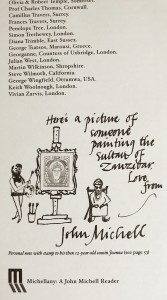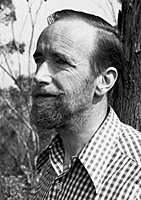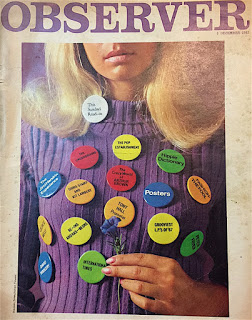 Found in a book called Michellany: a John Michell Reader (2010) a list of subscribers. John Michell, whose most famous book was The View Over Atlantis (1969) was an esotericist and a major figure in the development of the counterculture /Earth mysteries movement.
Found in a book called Michellany: a John Michell Reader (2010) a list of subscribers. John Michell, whose most famous book was The View Over Atlantis (1969) was an esotericist and a major figure in the development of the counterculture /Earth mysteries movement.
A senior figure from the Hippie era and scion of a wealthy family (Eton, Cambridge, Glastonbury) he had died in 2009 aged 76 and the book was a memorial anthology. Our copy had the small attractive bookplate, showing a bookish owl, of ‘Oz’ publisher, later media tycoon, Felix Dennis (1947 -2014) The lengthy subscriber’s list is worth recording- it brings together the great and the good of bohemian/ eccentric British, mostly upper class, society…
Ahmed Ainsworth, The Lady Ashcombe, Patti Baker, A. D. Bakewell, Michael Balfour, Richard Barnes, David Batterham, Opi Bell, Gerard Belleardt, David Benedictus, Phyllis Benjamin, Mary Berg ,Elizabeth Best, James Birch, Charlotte Black, Sir Peter Blake, Ralph Blum, Jill Bond, Laura and Harry Boothby, Joe Boyd, N. Van Den Branden, Mr and Mrs Michael Briggs, Theadora Brinkman, Paul Broadhurst, Alex Brown, Sir Anthony and Lady Shelagh Montague Brown, Peter Browne, Sally Burgess, Dr Aubrey Burl, Simon Buxton, David Cadman, Joseph Caezza, Tarquin and Sophie Campbell, Chung Yee Chong, Mrs O.D.H. Claus, Lord and Lady Patrick Conyngham, Prof Pierre and Helene Coustillas, Keith Critchlow, Paul Cullivan, Major General and Mrs Andrew Cumming Bronwen Cunningham, Karen D’Arc, Michael R. Davies, Robert Dudley, Belinda Eade, Mrs V. A. Ehlers, Jacquetta Eliot, Prof Richard England, Ness Eyre, David Fideler,
Continue reading

 Found – the typescript of a review by
Found – the typescript of a review by 
